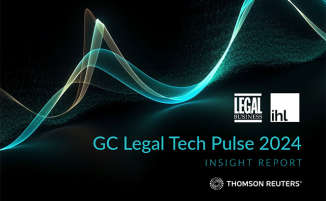Walking trees. High-fives. A cinema. Virtual reality headsets. Arcade games. Disco balls. General counsel (GCs) dressed as Willy Wonka. Filing cabinet piñatas. T-shirts reading ‘no bullshit’ and nobody in a suit and tie.
Since its debut in 2016, legal tech community Legal Geek’s annual conference has grown dramatically from a respectable 500 attendees to more than 2,000 packing out a former brewery near London’s Brick Lane.
The event is the brainchild of Legal Geek founder and legal tech start-up community lynchpin Jimmy Vestbirk. He kicked proceedings off Wednesday (16 October) from the main stage, where it was standing-room only, by setting the tone for a different type of law conference: ‘Anyone who’s been here before knows we like to start by high-fiving the people around you.’
The eruption of high fives was followed by an invoking of the conference’s start-up roots, with Vestbirk adding: ‘Today is not about hierarchy. The legal profession is very hierarchical, but the student is as likely to change the profession as the managing partner.’
No managing partners were present to hear, however. The senior end of in-house was better represented, with figures such as Chris Fowler, technology GC for telecoms giant BT, and Panasonic’s associate GC for legal innovation Bea Miyamoto among the speakers. Thomson Reuters’ newly-recruited chief strategy officer Richard Punt also spoke, while New Law was represented by Daniel Reed, chief executive of US-based alternative legal services provider, UnitedLex.
A key point at this year’s conference was the need for in-house legal functions and private practice to get a grip on their data. ‘Most legal functions face increased demand and pressure to reduce cost,’ said EY Riverview Law chief executive Karl Chapman (pictured). ‘Legal cannot avoid the need to use the right data. A staggering amount of work legal teams are doing should not be in the legal function and not be done by lawyers.’
Anna Power, GC at American retailer Crabtree & Evelyn, reiterated the point: ‘Data can help demonstrate value and the need for something, but some of the metrics to get hold of that data are hard to find and it’s not clear how to do it.’
There was wide agreement among the speakers that compared to other professional services, legal is slow to make data and digital a pervasive force throughout the industry. Reed in particular took opportunity to stress the need for a digital revolution throughout Big Law, noting: ‘Digital fluency is a pre-requisite to a legal society moving forward. Law needs to get a grip on its data.’
Meanwhile, in a space awash with technology tools tailored to niche concerns, companies and firms were being encouraged to move towards broader platforms to address their needs. ‘We have too many pieces of tech that do not talk to one another,’ Fowler confessed. ‘This means manual processes are in play between them which increases points of failure. We need to move towards a platform environment.’
Likewise, others stressed that while finance had SAP and sales had Salesforce, legal is overdue an equivalent platform which permeates the work of a legal function. But technology providers are seemingly taking heed. When in January Thomson Reuters snapped up legal software provider HighQ, it was done so with a view towards integrating existing tools into the HighQ platform. This will include Thomson Reuters’ flagship contract tool Contract Express, which is now in the process of being integrated into HighQ alongside other products at the technology giant.
Punt, among others, warned that consolidation was inevitable in such a fragmented industry; an ominous message for the many nascent data extraction and contract tools with stands on the strip coined ‘Start-up Alley.’ Standing out among the new names were some of the longer-standing players, with Legatics, Orbital Witness and Avokka all returning to the circuit. Outside the alley, well-known names Luminance and Lexoo were also exhibited.
Echoing a theme of many speakers, Punt noted: ‘There will be consolidation because legal technology is an extraordinary fragmented industry, and that’s true of every part of the wider industry.’ Reed at UnitedLex noted the challenge for smaller players of achieving the scale to build credible business models: ‘Start-ups need to achieve scale quickly, otherwise they’ll remain a ripple forever and never be a current.’
The start-ups themselves had been decamped from the prime real estate next to the conference’s entrance they enjoyed last year, with the main sponsors Freshfields Bruckhaus Deringer, iManage, Barclays and Thomson Reuters dominating the conference space.
Some vendors felt Legal Geek’s burgeoning size – though a great sign for interest in the market – removed some of the event’s original intimacy and networking benefits. One company’s head of sales complained the turnout was fuelled by juniors being sent on intelligence missions, and the event lacked the juice – and buying power – brought by more senior figures.
Not all were worried. In his opening address Vestbirk lauded the fact attendees’ name tags did not reveal a person’s role within their company or firm, in the hope it would create a more egalitarian environment.
But undoubtedly the conspicuous absence was senior leadership figures from private practice. One sponsor told Legal Business they feared the event had become ‘the converted speaking to the converted’ while one company complained that the conference had become the same faces broadly saying the same things.
Nevertheless, Legal Geek has succeeded in creating one of the most diverse legal conferences in the area. A glance over the packed audience to the main stage revealed a diverse and energetic community from which legal’s monoculture could learn a great deal. But, despite its remarkable size, there remains swathes of the legal profession Legal Geek is unable to proselytize.
However, such challenges are arguably a product of Legal Geek’s success: with packed crowds and plenty of energy, attention in the event shows no signs of waning.
thomas.alan@legalease.co.uk
Click here to see Legal Business’s extended focus on the start-up community















